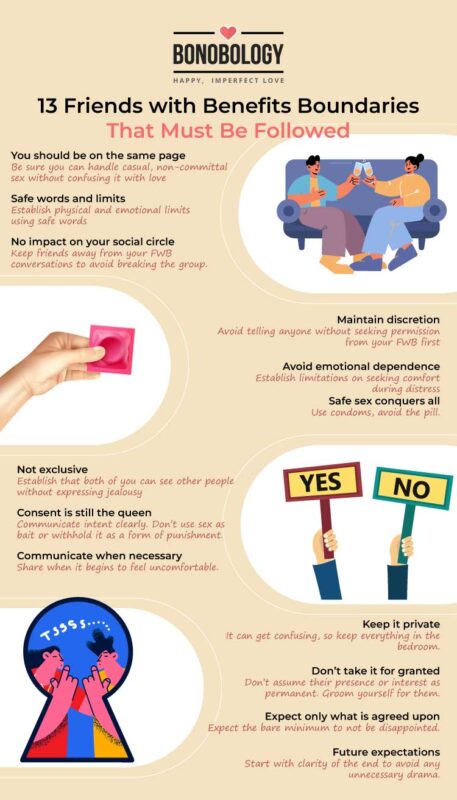Psychologist Nandita Rambhia (MSc, Psychology), who specializes in CBT, REBT, and couples counseling, helped us analyze the friend-with-benefits dynamic. She says, “When you are friends with benefits, it means that you get into a sexual relationship, but you don’t get romantically attached or you don’t have future plans as a couple together.”
13 Friends With Benefits Boundaries That Must Be Followed
You might think that it’s easier to have sex in the night and then pretend nothing happened the next morning. You might think a conversation will make it a bigger deal than it is. But without a conversation, you could end up obsessing over it. Questions like these are not uncommon on dating forums: “Do friends with benefits talk every day?” “Do friends with benefits travel together?” “Do guys care about their FWB?” “What not to do in a friends-with-benefits relationship?” People often wonder if a friends-with-benefits relationship actually works. But, the friends-with-benefits dynamic works well for people who have a mutual attraction, and both of them are aware that they’re either romantically incompatible or simply unavailable. However, it’s possible to develop feelings when you’re in such close proximity. And if these feelings are not reciprocated, then someone is bound to get hurt. Mila Kunis and Justin Timberlake showed this fairly well in Friends With Benefits. So, let’s have an in-depth look at the friends-with-benefits boundaries that must be maintained for the benefit of both parties:
1. You should be on the same page
Nandita says, “You need to discuss the relationship with your friend with benefits. It’s very important that the communication is very clear as to what you’re getting into. It is highly possible that if things are not clear between the two people, then they might have different expectations from each other.” Both of you should be sure you can handle casual, non-committed sex. If one of you has a pattern where you have trouble separating love from sex, it may not be a good idea then. If you develop feelings for your friend with benefits and expect them to reciprocate simply because you consensually sleep with them, then throw the Mills & Boons right away that gave you the crazy idea. It’s just a recipe for disaster. Bail out, if casual is not your thing. You’ll save yourself some tears.
2. Safewords and limits
Nobody expects you to create a Fifty Shades of Grey NDA about soft limits, but both of you should know where the friends-with-benefits boundaries lie. Establish what you can and can’t tolerate. FWB texting rules or social media rules can be a great starting point to decide what can or can’t be talked about, or how public you want your relationship to be. Also, you could decide on rules for texting FWB, like “Neither of us will send greetings of the day or romantic Valentine’s day gifts“. Similarly, you can decide the places you would feel comfortable meeting, and how many times a week or a month you want to be sexually intimate. Use safewords to suggest they’re crossing a line. For example, ‘yellow flag’ if you start to feel overwhelmed in the relationship, or ‘red flag’ if some serious lines have been crossed and you need some time off. Though it sounds like a task, it helps avoid any heartbreaks later.
3. Don’t let this impact your social circle
If both of you have common friends, there’s a high chance they’ll get affected too. Don’t involve them in your friends-with-benefits conversations unless you like awkward pauses while everyone imagines you two naked. Don’t expect them to take sides either, in case things turn sour. At best, it’ll break the group. At worst, the Lily Aldrin of your group will manipulate both of you into a relationship that neither of you wants.
4. Discuss who needs to know
Declaring an FWB relationship without discussing it with your partner is not a good idea. Think of it as your responsibility in the relationship to respect the privacy of your FWB. Nandita says, “The role of discretion is important because not everybody will understand this kind of a relationship. Close friends or people you trust may understand, but it’s best to not take their maturity for granted. So, don’t scream it out to the world unless it’s mutually consented upon.” This has to be one of the friends-with-benefits rules to swear by. Don’t test friends-with-benefits boundaries by calling them your fuck buddy when the other person isn’t comfortable with that label. Or by giving other people the wrong idea that you two are romantically committed. Avoid telling your family if they’re traditional people. People love the idea of a romance and it won’t be soon before they start nagging you or your friend. Plus, people can be judgemental. The spotlight an FWB relationship can bring onto someone can be extremely taxing. So, be careful about who you tell about your dynamic.
5. Avoid emotional dependence
Like a plague. Reddit users abide by this and stress strongly on avoiding emotional connection. You could be having a horrible day, but if someone shows up with flowers and cuddles next to you, it feels so much better. But in a casual relationship, it can be very confusing. Don’t do anything that could be misunderstood. Avoid activities that may become a pattern, like sleeping next to each other or candle-lit dinners. Just behave like a regular friend who would bring beer and ask you to pay your share. To avoid the violation of any emotional limits, Nandita says, “If you have communicated with each other that you’re not going to get emotionally involved, that means you have set certain boundaries or rules. It’s important to check with each other regularly, that both of you are on the same page and neither of you is crossing a boundary that can complicate the relationship.”
6. Safe sex conquers all
When you get into an FWB relationship, it’s to avoid commitment. It won’t be a great idea if you end up getting pregnant. Because that is a hell of a commitment. And, it’s never safe to have sex with UTIs. Friends-with-benefits boundaries must take into account that not everyone is monogamous. So, insist on using condoms every time you have penetrative sex.
7. It’s not an exclusive relationship
While talking about friends-with-benefits boundaries with each other, establish the fact that your dynamic won’t stop either of you from seeing other people, or even getting into a committed relationship with someone else. It’s a different type of relationship and this can’t be counted as cheating. You may or may not talk about other people you see. If you do feel jealous, which is a normal emotion to go through, then talk about it in a healthy, non-judgemental, and polite manner. But if you keep feeling jealous and don’t deal with it well, then expect the other person to shut the door on you right away.
8. Consent is still the queen
The friends-with-benefits boundaries protect a person from participating in things they don’t want. Remember, a casual relationship doesn’t translate into a non-stop orgy. Maybe add that to your rules for texting FWB – communication of clear intention before you arrive at their place. Because sometimes, they may just want to hang out. And there is nothing wrong with that as long as it’s not romantic or uncomfortable. Also, don’t use sex as bait or withhold it as a form of punishment. Don’t insist on nudes or send unsolicited ones. Let it be fun for everyone and don’t make a game out of it.
9. Do regular check-ins
People wonder, “‘Do friends with benefits talk every day?” They certainly do it periodically, as they’re still friends. It’s important to check in with your FWB if they still feel good about the arrangement or if they want to explore the relationship further. Nandita says, “Evaluate your thoughts and emotions, and once you’re clear that what you want to have is more than a friends-with-benefits relationship, it’s important to communicate this to your friend. You might get hurt or feel disappointed if your feelings are not reciprocated. Or you might be in luck if they feel the same way.” Keep looking for any red flags you should not ignore, like frequent calls, invitations to dinner, gifts, etc. that tell you if they’re becoming interested in you romantically. It’s also good to talk in case one of you decides to go monogamous in your other committed relationship or begins to feel uncomfortable in the agreement for any other reason.
10. Keep the intimacy in the bedroom
Try to keep all amorous activities inside the bedroom, or a private place you both decide on. You may go out, have dinner, and enjoy making out generally, but when you do it outside the realm of the sheets, the friends-with-benefits boundaries get blurred into that of a committed relationship. It can get confusing. Plus, no one wants to catch their friends kissing passionately while they declare it’s nothing serious. Awkward much.
11. Don’t take it for granted
You may ask, do friends with benefits work together? Or, do friends with benefits go out together? Or, do friends with benefits travel together? Yes, they do. Like regular friends, not lovers. It all sounds great and you’re lucky if you have this kind of arrangement with someone. Just don’t assume that your friend’s presence in your life is permanent. Don’t assume the same about their lust either. Even if they agree to have sex with no strings, that is not an agreement to endure a smelly mouth or lack of basic hygiene. If you consent to sex, groom yourself as you would for someone you like. Remember, casual doesn’t mean insensitive.
12. Expect only what is agreed upon
People often ask, “Do guys care about their FWB?” Yes, they do. They’re friends after all. But caring within a romantic relationship is different from caring as a friend. Psychologists warn about the friends-with-benefits dynamic since it can lead to heartbreak more easily than a traditional relationship. As a general rule of thumb, it’s better to expect the bare minimum. Stay within the friends-with-benefits boundaries and you won’t be disappointed.
13. Make a respectful exit plan
You have to be honest with each other that the arrangement will eventually come to an end if one of you gets committed to a monogamous relationship, or because you don’t experience the same sexual compatibility anymore. Or in a worse scenario, you stop being friends with benefits because you hurt each other and are no longer friends. So, when you start the relationship, you must have clarity on how you both will behave when it ends, to avoid any unnecessary drama. And abide by it. Nandita says, “If you have set certain rules in your relationship, and if either of you can not adhere to what you’ve decided, it’s obvious that it’s not working. It is a precarious kind of relationship and only works in the short term. As individuals, we are unique and can’t control our emotions strictly in accordance with a rule. If you feel you’re crossing lines, or unable to stick to the rules, which could be as many as you want, communicate to your partner and decide if you want to go ahead or end it.” Though people tend to focus on the ‘benefit’ part of an FWB relationship, I think the important word here is ‘friend’. Because this is not a hookup where you meet a random stranger and don’t see them afterward. This is someone you know well and are friends with. As long as you are clear on friends-with-benefits boundaries, the relationship can function. If not, an FWB relationship can get complicated very easily. And that’s certainly not beneficial.



